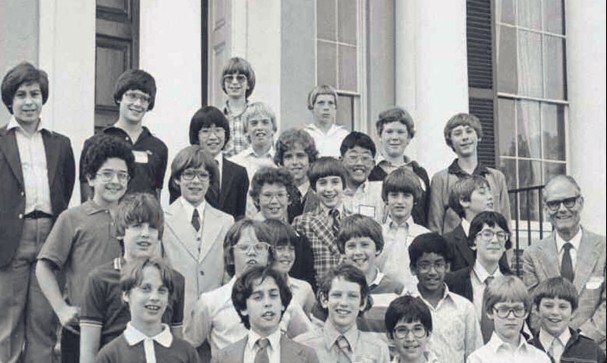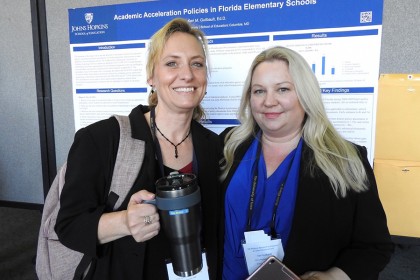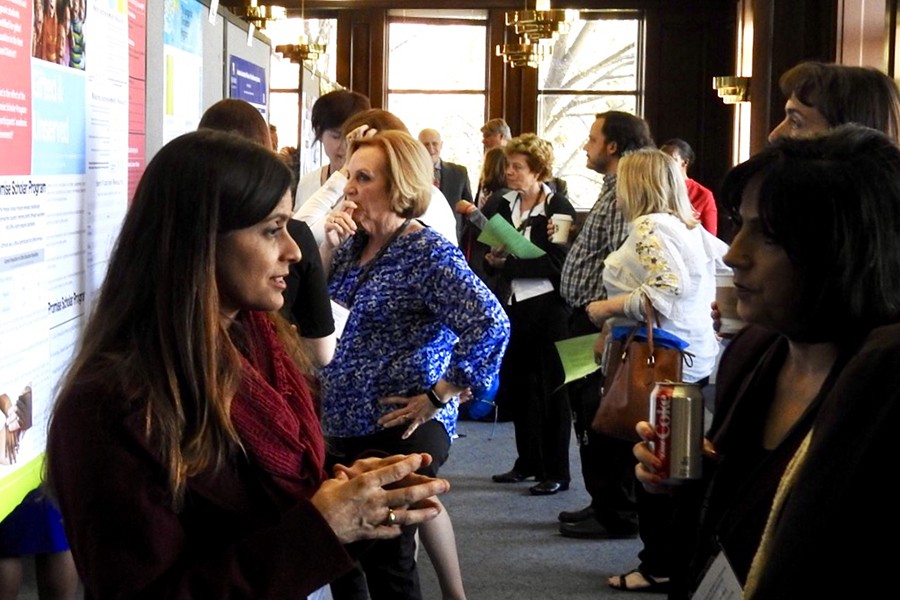Some of the brightest stars in gifted education converged in Baltimore last week to celebrate strides made in the field and to discuss plans for the future.
The Johns Hopkins Center for Talented Youth co-hosted the 12th annual Wallace Research Symposium on Talent Development on its Mt. Washington campus April 29 to May 1, bringing about 200 scholars and educators from around the world together to share research findings and personal stories about their work with exceptionally bright students.
Co-sponsored by the University of Iowa Belin-Blank Center and Vanderbilt University Study of Mathematically Precocious Youth, the symposium also celebrated Julian C. Stanley, the late Johns Hopkins psychologist whose pioneering work with exceptional students formed the foundation for CTY and the gifted education field as we know it today. Born 100 years ago this July, Stanley began his groundbreaking research in the late 1960s, mentoring advanced students, accelerating their curriculum, and advocating for their early entrance to college. Stanley's use of above-grade-level testing—for example, gauging 7th grade students' potential based on their SAT scores—was considered radical when first introduced. Today it is standard practice for talent searches at CTY and around the country.

Image caption: Julian Stanley (right), a psychologist and founder of the Johns Hopkins Center for Talented Youth, with some of his early math prodigies in 1987.
Image credit: JOHNS HOPKINS UNIVERSITY PHOTO
Stanley also encouraged young students to participate in early-college programs and academic competitions, said Linda Brody, a former graduate student of Stanley's and the director of CTY's Diagnostic and Counseling Center.
"As a result, students today have a greatly expanded menu of opportunities to accelerate their educational programs and pursue their interests outside of school, which were not available prior to Stanley's efforts," Brody said.
Conference attendees agreed there is still much work to do, as research shows millions of advanced children spend their days in U.S. classrooms starving for a greater academic challenge.
"Students performing above grade level likely exist in every classroom in every school," said Jonathan Plucker, an education policy expert and professor of talent development with a joint appointment at CTY and JHU's School of Education. Despite their prevalence, countless students with advanced abilities are not identified nor given access to accelerated coursework to challenge them beyond grade level, Plucker said. Many states lack cohesive gifted-education policies to address how these students are identified and supported.

Image caption: Johns Hopkins School of Education professors Amy Shelton (left) and Keri Guilbault
Image credit: Katy Bowman
Compounding this problem is the fallacy that advanced students don't need educational interventions the way struggling students do.
"'Don't worry about them; they are going to be just fine'—I hear that all the time," said Julia Link Roberts, director of the Center for Gifted Studies at Western Kentucky University.
But there is strong evidence that interventions can be life-changing for exceptionally advanced children. The most comprehensive research on the subject, the Study for Mathematically Precocious Youth—a longitudinal study begun by Stanley at Hopkins in 1971—tracks more than 5,000 students who received early interventions and has provided considerable insight into their outcomes.
A 2016 Scientific American article about the study surmised, "With the first SMPY recruits now at the peak of their careers, what has become clear is how much the precociously gifted outweigh the rest of society in their influence."
Interventions can take many forms, including ability grouping, acceleration, grade skipping, and early college entrance. The key is recognizing that exceptionally smart students have unique needs, and devoting time and resources to address them.
"Some people say, 'These (bright) kids aren't going to be homeless; they'll be OK. But we also know that if you're in an asynchronous situation with your schooling, it could be cause for great emotional upheaval," said Jason Gorgia, a public-school math teacher from Virginia. "There is so much talent in this country, and we have to be more creative with our resources in how we support it."
Posted in Politics+Society
Tagged education, center for talented youth










